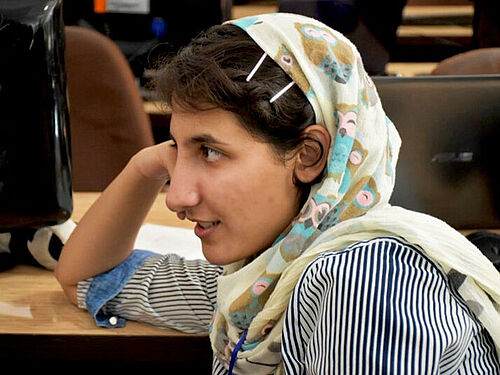The 21-year-old Iranian Elahe Sadeghi planned to travel from Iran to Bochum in April 2020 as an exchange student and complete a three-month internship at CASA. Or at least that was her plan before Corona.
However, the pandemic and the political situation did not allow for an internship in presence. The solution: a remote internship. It might also be called a virtual internship, home office internship or remote work placement. The concept remains the same and is being used in more and more areas of work where people can do their work on the computer. Is there anything better suited for this than an internship in IT security?
But how did the remote internship come about in the first place?
Sadeghi studies mathematics and computer science at Sharif University of Technology in Tehran. While researching for her studies, she also stumbled upon scientific contributions by Prof. Dr. Eike Kiltz. He is a mathematician and researches in the field of cryptography of the future at CASA. His research focus is on the theoretical foundations of asymmetric encryption methods. Impressed by Kiltz' work, Sadeghi contacted the researcher about ten months ago after further research.
It was clear to the ambitious student that she wanted to delve deeper into cryptography and gain experience in research. Convinced of Sadeghi's devotion, the internship was to be possible despite obstacles - online.
How did the internship turn out?
The young researcher completed the internship full-time as planned. Under the supervision of Eike Klitz, Sadeghi was entrusted with a research question, and the content of her work was concerned with digital signatures in cryptography.
In her theoretical work, the concern is that the human aspect of an internship and networking may come off badly. This was also the concern of Sadeghi. But the weekly zoom meetings and the e-mail traffic, where she was able to exchange ideas with the team around Eike Kiltz, proved her wrong.
As part of the research team, she also worked on preparing a scientific paper on the results of the research beyond her internship and continues to exchange ideas with her former colleagues. The Iranian student summarizes: "It was a great experience, and I learned a lot." She further recommends the concept of the remote internship.
For the future, Sadeghi aims for a master's degree after completing her bachelor's degree, but the young researcher is not ruling out a doctorate either - maybe even at the RUB.
General note: In case of using gender-assigning attributes we include all those who consider themselves in this gender regardless of their own biological sex.


